Featured Posts

- Index of Psychological Studies of Presidents and Other Leaders Conducted at the Unit for the Study of Personality in Politics
- The Personality Profile of U.S. Supreme Court Associate Justice Brett Kavanaugh
- The Leadership Style of North Korean Leader Kim Jong-un
- North Korea Threat Assessment: The Psychological Profile of Kim Jong-un
- Russia Threat Assessment: Psychological Profile of Vladimir Putin
- The Personality Profile of 2016 Republican Presidential Candidate Donald Trump
- Donald Trump's Narcissism Is Not the Main Issue
- New Website on the Psychology of Politics
- Unit for the Study of Personality in Politics --- 'Media Tipsheet'
categories

- Afghanistan (228)
- Al Gore (2)
- Amy Klobuchar (4)
- Ayman al-Zawahiri (7)
- Barack Obama (60)
- Ben Carson (2)
- Bernie Sanders (7)
- Beto O'Rourke (3)
- Bill Clinton (4)
- Bob Dole (2)
- Campaign log (109)
- Chris Christie (2)
- Chuck Hagel (7)
- Criminal profiles (8)
- Dick Cheney (11)
- Domestic resistance movements (21)
- Donald Trump (31)
- Economy (33)
- Elizabeth Warren (4)
- Environment (24)
- George H. W. Bush (1)
- George W. Bush (21)
- Hillary Clinton (9)
- Immigration (39)
- Iran (43)
- Iraq (258)
- Jeb Bush (3)
- Joe Biden (13)
- John Edwards (2)
- John Kasich (2)
- John Kerry (1)
- John McCain (7)
- Kamala Harris (5)
- Kim Jong-il (3)
- Kim Jong-un (11)
- Law enforcement (25)
- Libya (18)
- Mahmoud Ahmadinejad (6)
- Marco Rubio (2)
- Michael Bloomberg (1)
- Michele Bachmann (173)
- Mike Pence (3)
- Military casualties (234)
- Missing person cases (37)
- Mitt Romney (13)
- Muqtada al-Sadr (10)
- Muslim Brotherhood (6)
- National security (16)
- Nelson Mandela (4)
- News (5)
- North Korea (36)
- Osama bin Laden (19)
- Pakistan (49)
- Personal log (25)
- Pete Buttigieg (4)
- Presidential candidates (19)
- Religious persecution (11)
- Rick Perry (3)
- Rick Santorum (2)
- Robert Mugabe (2)
- Rudy Giuliani (4)
- Russia (7)
- Sarah Palin (7)
- Scott Walker (2)
- Somalia (20)
- Supreme Court (4)
- Syria (5)
- Ted Cruz (4)
- Terrorism (65)
- Tim Pawlenty (8)
- Tom Horner (14)
- Tributes (40)
- Uncategorized (50)
- Vladimir Putin (4)
- Xi Jinping (2)
- Yemen (24)
Links

archives

- November 2021
- January 2021
- November 2020
- October 2020
- September 2020
- August 2020
- July 2020
- April 2020
- March 2020
- February 2020
- January 2020
- December 2019
- October 2019
- July 2019
- May 2019
- April 2019
- March 2019
- February 2019
- January 2019
- December 2018
- September 2018
- August 2018
- July 2018
- June 2018
- April 2018
- March 2018
- February 2018
- January 2018
- August 2017
- July 2017
- June 2017
- May 2017
- April 2017
- February 2017
- January 2017
- December 2016
- November 2016
- October 2016
- September 2016
- August 2016
- July 2016
- June 2016
- May 2016
- April 2016
- March 2016
- February 2016
- January 2016
- December 2015
- November 2015
- October 2015
- September 2015
- August 2015
- July 2015
- June 2015
- May 2015
- April 2015
- March 2015
- February 2015
- January 2015
- December 2014
- November 2014
- October 2014
- September 2014
- August 2014
- July 2014
- June 2014
- May 2014
- April 2014
- March 2014
- February 2014
- January 2014
- December 2013
- November 2013
- October 2013
- September 2013
- August 2013
- July 2013
- June 2013
- May 2013
- April 2013
- March 2013
- February 2013
- January 2013
- December 2012
- November 2012
- October 2012
- September 2012
- August 2012
- July 2012
- June 2012
- May 2012
- April 2012
- March 2012
- February 2012
- January 2012
- December 2011
- November 2011
- October 2011
- September 2011
- August 2011
- July 2011
- June 2011
- May 2011
- April 2011
- March 2011
- February 2011
- January 2011
- December 2010
- November 2010
- October 2010
- September 2010
- August 2010
- July 2010
- June 2010
- May 2010
- April 2010
- March 2010
- February 2010
- January 2010
- December 2009
- November 2009
- October 2009
- September 2009
- August 2009
- July 2009
- June 2009
- May 2009
- April 2009
- March 2009
- February 2009
- January 2009
- December 2008
- November 2008
- October 2008
- September 2008
- August 2008
- July 2008
meta

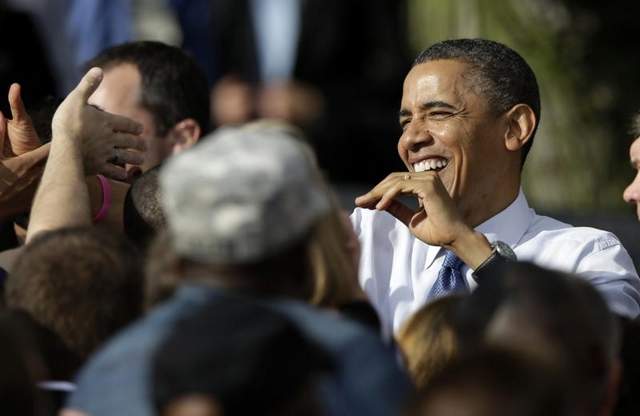
President Barack Obama greets supporters after speaking at a campaign stop Wednesday, Oct. 24, 2012 at the Mississippi Valley Fairgrounds in Davenport, Iowa. (Photo credit: The Associated Press via St. Cloud Times)
By Aubrey Immelman
St. Cloud Times
October 28, 2012
Anyone who claims to know for sure who’s ahead in the closely contested presidential race — pollsters and pundits included — is stretching the truth.
After President Barack Obama’s lackluster performance in the first debate Oct. 3 in Denver, challenger Mitt Romney surged in the polls. In a mere three weeks in October, Obama’s comfortable margins in national polls — including a double-digit lead in the key battleground state of Ohio — dwindled to a virtual tie, with Romney now edging ahead in some of the national polls and deadlocked with Obama in Ohio.
If Romney wins, the formula I developed to predict the winner in presidential elections prior to Super Tuesday will fail for the first time ever.
The heuristic model, developed in the Unit for the Study of Personality in Politics at St. John’s University and the College of St. Benedict almost two decades ago, employs candidate personality traits, as publicly perceived, to predict which contender will resonate most favorably with independent voters who base their choice on the candidate’s personal qualities rather than party political affiliation.
The model works, because the nation is so evenly divided among partisan Republicans and Democrats, essentially yielding the balance of power to political independents and low-information voters.
How it works
My research into the psychology of politics, spanning a quarter century, reveals that voters respond favorably to candidates that are outgoing, self-confident, and dominant; and negatively to candidates that are introverted and overly conscientious.
Take Bill Clinton, the top-ranked candidate on my “Personal Electability Index.†Clinton is among the most outgoing, engaging, gregarious personalities I have studied; he thrives on the exhilaration of retail politics, and it shows.
Not only that, but he brims with confidence, is socially poised, and has an ego that can fill a room – rolling with the punches and flourishing amid the cut and thrust of high-stakes politics.
On social dominance, Clinton scores more modestly, but what he lacks in toughness he makes up for with the thickness of his skin.
As for traits that play poorly in politics — introversion and conscientiousness — Clinton barely registers on the personality scale.
Not so for Al Gore, the lowest-ranking candidate on the personality index. His conscientiousness is off the charts, with painstaking meticulousness, obsessive attention to detail, and an at-times self-righteous certitude. Although some of these traits are admirable qualities in a president, on the campaign trail they feed public perception of the candidate as stiff and formal, pedantic and boring.
Moreover, Gore is among the most introverted major-party nominees since Richard Nixon. Introversion can be an asset in the Oval Office, permitting sustained focus, freedom from the shackles of the need to please, and a calm, placid, “no-drama†demeanor. But to voters, excessive introversion comes across as unempathic aloofness — a “wooden†quality that in its most ingrained form makes the candidate seem almost “robotic†— deficient in emotional expressiveness and spontaneity, and seemingly apathetic, with an unexcited, lifeless quality.
Obama vs. Romney
Of the three personal qualities that appeal to voters — extroversion, self-confidence and dominance — Obama trumps Romney on the first two traits, while the third one is a wash.
On the two attributes that diminish the personal attractiveness of candidates in the eyes of voters, neither Romney nor Obama is notably encumbered by introversion, but Romney raises the roof on conscientiousness, which on the campaign trail blows down the house.
In the end, Obama wins on points.
For historical context, here are the personality-based electability numbers for all major-party nominees since 1996, published before Super Tuesday in presidential election years, with the successful candidate or incumbent listed first:
• 2012: Barack Obama 28 (10), Mitt Romney 6
• 2008: Barack Obama 28, John McCain 26
• 2004: George W. Bush 31, John Kerry 9
• 2000: George W. Bush 31, Al Gore (-)17
• 1996: Bill Clinton 37, Bob Dole 15
Does personality matter? You decide.
For more information about how the Personal Electability Index scores were calculated, visit www.immelman.us/news/why-mitt-romney-wont-win/
The upshot
Personality is remarkably stable after the fourth decade of life. Nonetheless, more out of curiosity than for any pressing purpose, I collected additional personality data on Obama this summer, limited to his term in office. I was startled to discover that his electability score had dropped from 28 to 10 since his 2008 campaign.
Although that number is still marginally higher than Romney’s, a score of similar magnitude in 2008 would have portended a McCain victory in my predictive model.
Something happened. The person America elected in 2008, infused with hope and the promise of change, emerged as a changed man from the Rose Garden in 2012 to defend his title as the world’s most powerful leader.
This is the opinion of Aubrey Immelman, a political psychologist who specializes in the psychological assessment of presidential candidates. He also was a candidate in the U.S. House 6th District Republican primary. His leadership profiles of Mitt Romney and Barack Obama were published in the Aug. 30 and Sept. 8 Times editions.
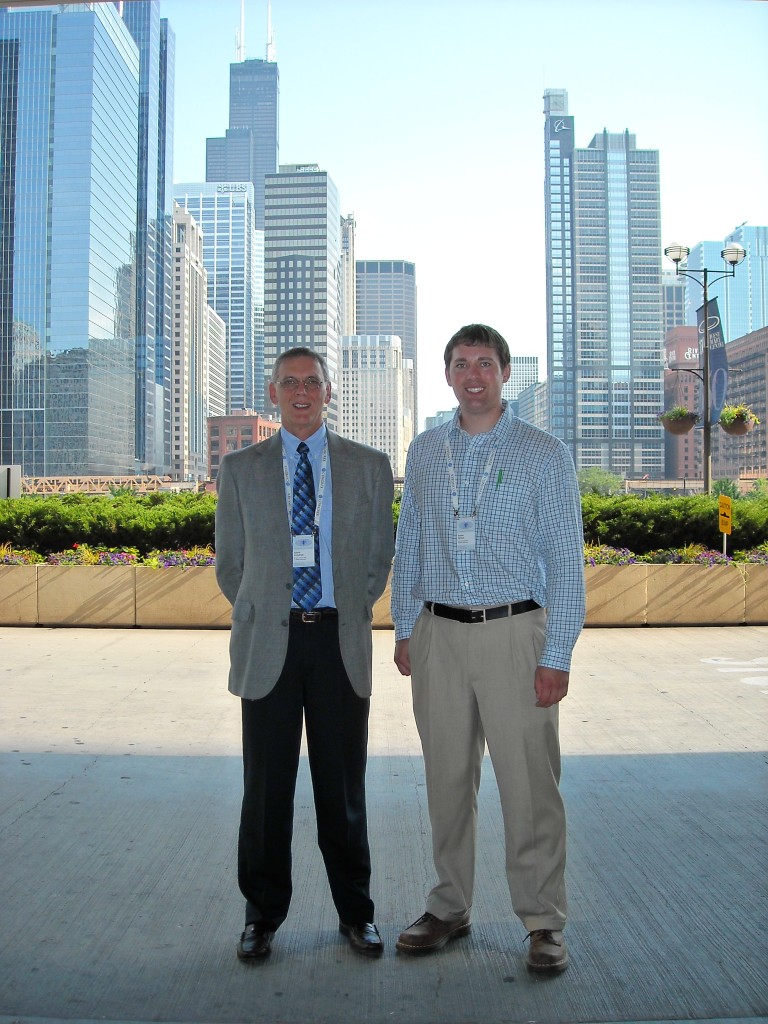
Aubrey Immelman and Andrew Obritsch in Chicago at the annual scientific meeting of the International Society of Political Psychology to present their research on Barack Obama and Mitt Romney, July 2012.
—————————————————————
Related reports on Barack Obama
Barack Obama’s Presidential Leadership Style (Sept. 8, 2012)
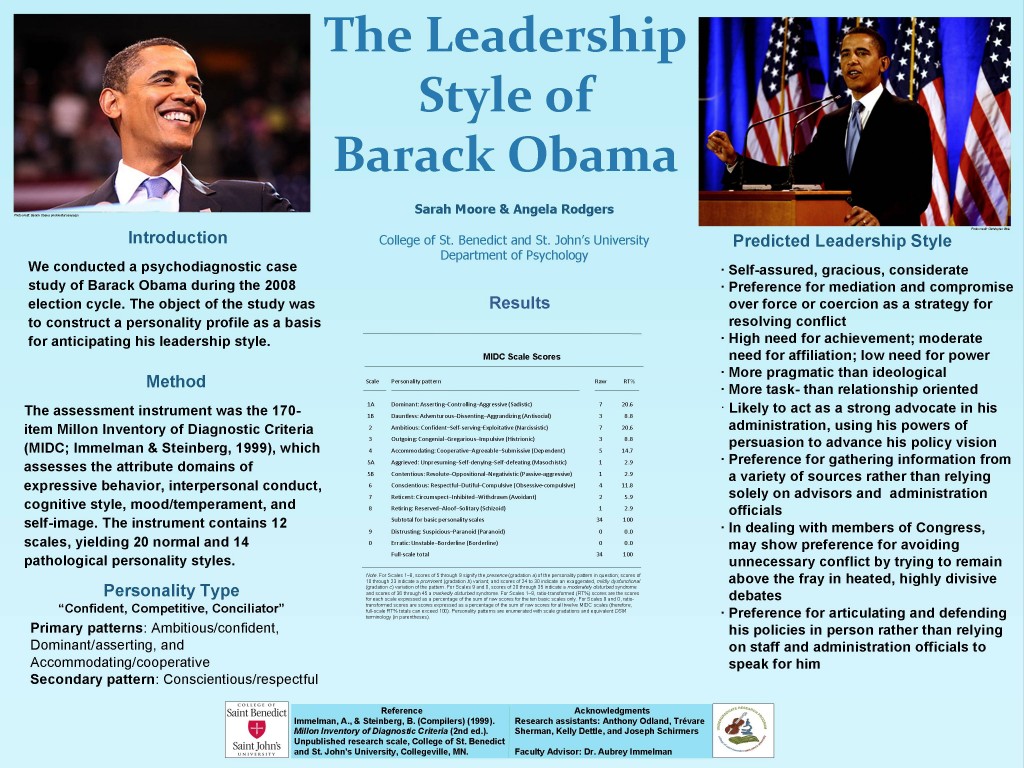
Click on image for larger view
A psychological profile of U.S. President Barack Obama, developed at the Unit for the Study of Personality in Politics during Obama’s 2008 and 2012 presidential campaigns, reveals that the president is a highly confident, moderately accommodating and deliberative, somewhat reserved personality type best described as a confident conciliator.

Click on image for larger display
As shown in the pie chart above, Obama is primarily an Ambitious-confident personality, complemented by secondary Accommodating-cooperative, Conscientious-respectful, and Retiring-reserved features.
Obama’s personality profile provides a stable framework for anticipating his likely leadership style as president if reelected.
Barack Obama’s Leadership Style (Feb. 21, 2009)
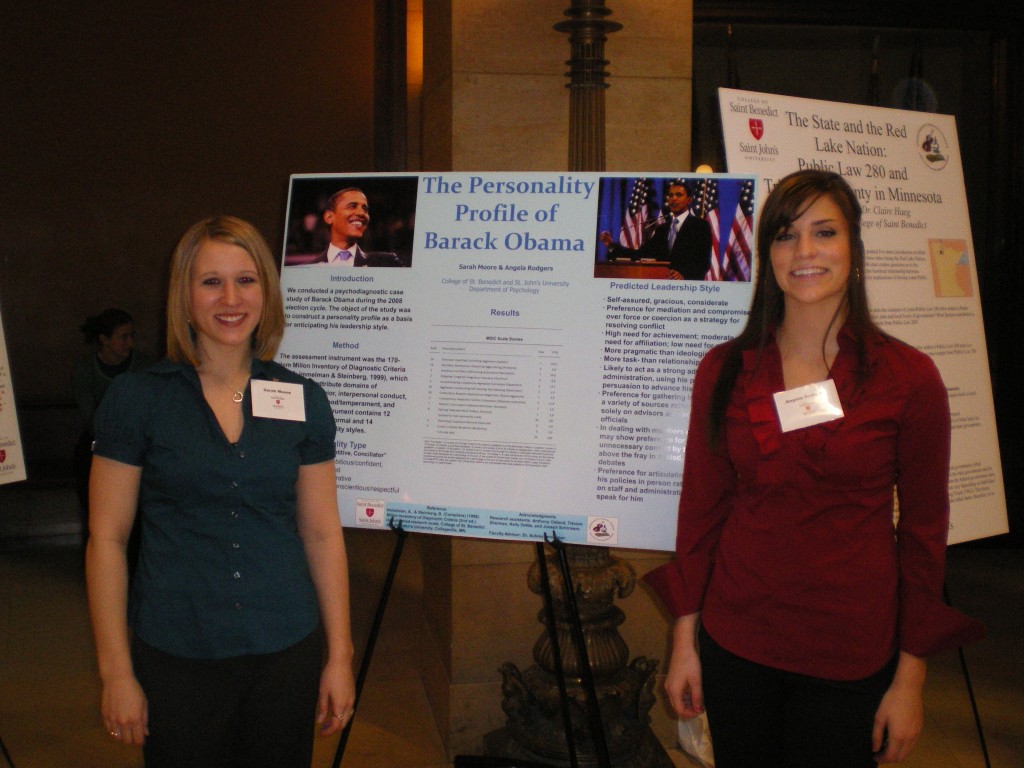
Research assistants Sarah Moore and Angela Rodgers presented their research on “The Personality Profile of President Barack Obama: Leadership Implications†at the 6th annual Minnesota Private Colleges Scholars at the Capitol event in the State Capitol rotunda, St. Paul, Minn.,  Feb. 19, 2009.
Barack Obama’s Personality Profile (Nov. 2, 2008)
————————————————————
Related reports on Mitt Romney
Mitt Romney’s Leadership Style (Sept. 3, 2012)
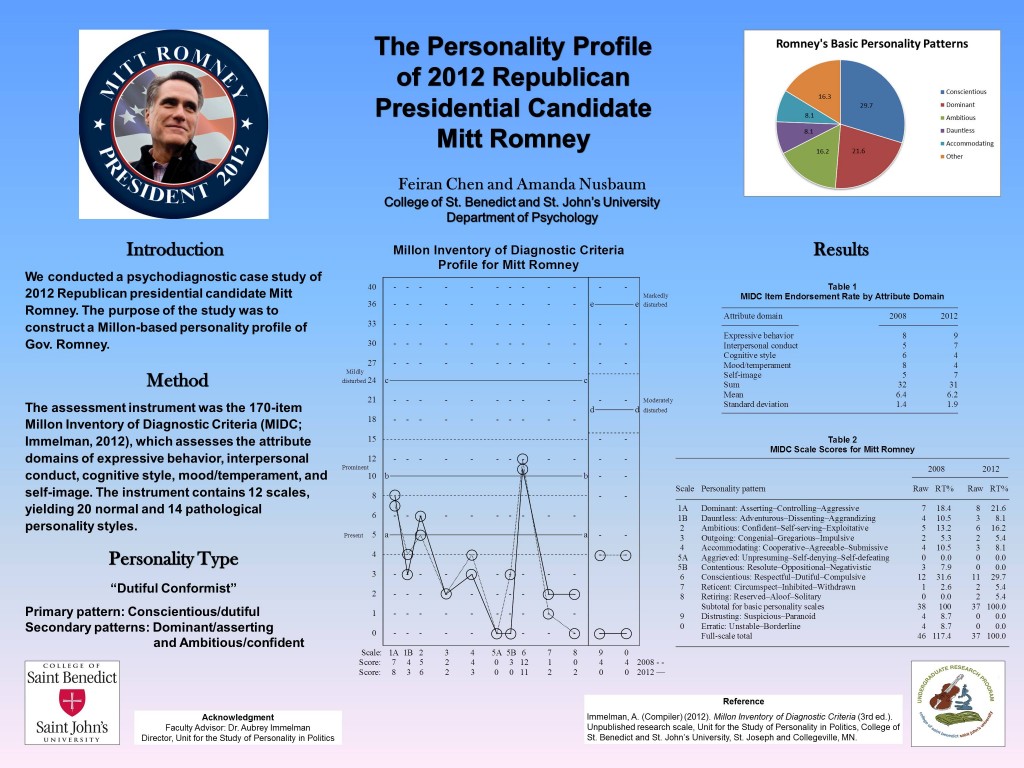
Click on image for larger view (not part of St. Cloud Times report)
A psychological profile of former Massachusetts governor Mitt Romney, developed at the Unit for the Study of Personality in Politics during Romney’s 2008 and 2012 presidential campaigns, reveals that the Republican nominee is highly conscientious, with a personality type best described as a dutiful conformist.

Click on image for larger display
As shown in the pie chart above, Romney is primarily a Conscientious-dutiful personality, complemented by secondary Dominant-asserting, Ambitious-confident, and Accommodating-cooperative features and a minor Retiring-reserved tendency.
Romney’s personality profile provides a stable framework for anticipating his likely leadership style as president, if elected.
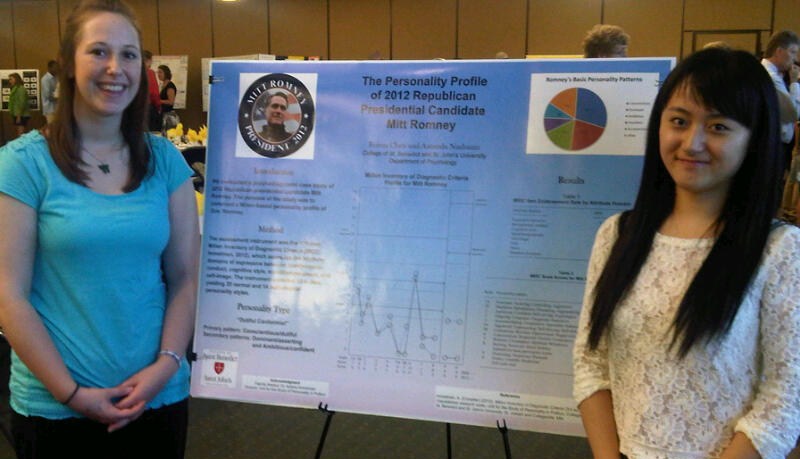
Research assistants Amanda Nusbaum and Feiran Chen presented their research on “The Personality Profile of 2012 Republican Presidential Candidate Mitt Romney†at the College of St. Benedict in St. Joseph, Minn., July 30, 2012.
Personality Matters: Mitt Romney Has Al Gore Problem (Jan. 16, 2012)
Obama Campaign Tilting at Romney Windmill (Aug. 9, 2011)
Mitt Romney’s Personality Profile (June 2, 2011)
Why Mitt Romney Won’t Win (May 12, 2011)
——————————
Related reports
Romney or Obama? Political Scientists Make Their Predictions

By Dan Balz
The Take
![]()
September 29, 2012
[…]
Out now are a baker’s dozen forecasts produced by political scientists that predict the outcome in November. …
The election forecasts are in fact predictions, based on various and varied statistical models. Most give the advantage to the president, but the verdict is not unanimous.
The 13 projections are contained in the new issue of PS: Political Science and Politics, which is published by the American Political Science Association. Eight of them project that Obama will win the popular vote; five say the popular vote will go to Romney. But the degree of certainty in those forecasts differs. One projection favoring the president says there is an 88 percent certainty that he’ll win, while two others forecasting Obama say there is only a 57 percent certainty.
James E. Campbell, the department chairman at the University at Buffalo in New York, who wrote the introduction to the package, rates them this way: Five predict that Obama will win a plurality of the two-party vote, although three are on “the cusp of a toss-up.†Five predict that Romney will win the plurality of the two-party vote. Three are in what he calls the toss-up range. …
Several of these scholars will talk more about forecasting elections on Oct. 16 [2012] at the National Press Club. …
————
![]()
Professor-Created Models Predict Obama Will Barely Win 2012 Election
By Emily Wilkins
Scripps Howard Foundation Wire
October 17, 2012
WASHINGTON — Fluctuating polls aren’t the only way to predict an election. Thirteen different models published in the October issue of Political Science and Politics (PS) give incumbent President Obama the win — but just barely.
The forecasts, which show the election to be much closer than the 2004 or 2008 elections, give Obama an average .06 percent lead ahead of Romney.
James E. Campbell, a political science professor at the University of Buffalo, helped select and edit the models for the October issue of PS. Campbell and three other professors who created forecasts spoke Oct. 16 at the National Press Club. …
This is the third election year the models have been collected into PS. In 2004 and 2008, a majority of the models correctly predicted the elections of George W. Bush and Obama.
This year, there’s less agreement. Of the 13 models, five predict Romney, five predict Obama, and three are toss-ups.
Because each model uses different factors in predicting the election, the results of each model are not the same. In nearly every report, changes in the economy played a role. Some forecasts used direct numbers from the economy, while others examined how the electorate has reacted to changes in the economy. Other factors included popularity of the current president, jobs and current polls.
When each forecast is taken individually, the highest Obama can get is 53.8 percent of the vote, and the lowest he can get is 46.9 percent.
“What we see every day in the newspaper and in the models is this conflict or confusion of all the numbers, and they’re not all going in the same direction,†said Michael S. Lewis-Beck, a professor of political science at the University of Iowa. “I think this is pointing to the tightening of this race and uncertainty of this race.â€
When creating the models, professors seek to predict the correct winner rather than picking their favorite candidate, Campbell said. Although he is a Republican, Campbell predicts Obama will win with about 52 percent of the popular vote. He predicted Clinton’s victories in 1992 and 1996.
“That’s one of the nice things about a statistical model,†Campbell said. “If you have it in place before the election, the numbers speak for themselves.â€
He added that he wasn’t very happy to predict Clinton – save the fact that he was right.
Thomas M. Holbrook, chair of the department of political science at the University of Wisconsin, correctly predicted George W. Bush and Obama’s wins in 2004 and 2008. Using a model that examines presidential approval ratings and personal finances of the electorate, he predicts a Romney victory.
Holbrook acknowledges that Obama was leading the polls for a while and was even being declared the victor by some groups. But according to the model, it just meant some event – in this case the first debate – would even things out.
“Campaign events serve as a corrective,†he said. “If a candidate is running way ahead of the polls, a campaign event favoring the other candidate can correct that overexuberance to bring public opinion back into line with the expected outcome.â€
Reach reporter Emily Wilkins at emily.wilkins@shns.com or 202-326-9867. SHFWire stories are free to any news organization that gives the reporter a byline and credits the SHFWire.
—————
Sidebar

—————————
Policy Proposal
Move Over Economists: We Need a Council of Psychological Advisers
By Barry Schwartz
The Atlantic
November 12, 2012
Though President Obama won reelection decisively, he won’t have much time to celebrate. Many of the nation’s problems — stimulating employment, reducing the deficit, controlling health-care costs, and improving the quality of education — are very serious, and some of them must be addressed with great urgency. …
Historically, when the need has arisen to change behavior, political leaders have turned to economists. That’s one reason why presidents have a Council of Economic Advisers. When economists speak, presidents listen. And when economists have the president’s ear, all their whispers are predicated on a set of assumptions about human behavior. … They will for example argue that people are motivated by self-interest and are rational calculators of their interests, and that the most effective way to get people to change the way they behave is by creating the right material incentives.
Now, people are sometimes rational calculators, but often they are not. And self-interest and incentives certainly matter, but they aren’t all that matters. The perspective of economists is importantly incomplete, sometimes even misguided.
That’s why we need psychologists whispering in the president’s other ear — about the economy, but also about education, health care, and more. The United States needs a Council of Psychological Advisers — a new body that would parallel and complement the Council of Economic Advisers — to bring actual experts on human behavior into the most senior levels of conversation about how to change it. …
Leave a Reply
You must be logged in to post a comment.




October 30th, 2012 at 12:13 am
From the report: “After President Barack Obama’s lackluster performance in the first debate Oct. 3 in Denver, challenger Mitt Romney surged in the polls. In a mere three weeks in October, Obama’s comfortable margins in national polls — including a double-digit lead in the key battleground state of Ohio — dwindled to a virtual tie, with Romney now edging ahead in some of the national polls and deadlocked with Obama in Ohio.”
As reported by NBC News’ Domenico Montanaro, Oct. 29, 2012: “Romney has undoubtedly made gains nationally and in battlegrounds after the president’s lackluster first presidential debate. Despite the president winning the next two debates, the damage was done. Romney pulled even or ahead in Colorado and Virginia and now seems a very narrow favorite in Florida, a state he must win. There’s almost no conceivable path to 270 for Romney without it.”
http://firstread.nbcnews.com/_news/2012/10/29/14783817-romney-obama-camps-spar-over-whos-really-winning
October 30th, 2012 at 3:21 am
[…] Why Mitt Romney Won’t Be President — In Theory (Oct. 29, 2012) […]
October 30th, 2012 at 3:22 am
[…] Why Mitt Romney Won’t Be President — In Theory (Oct. 29, 2012) […]
October 30th, 2012 at 3:26 am
[…] Why Mitt Romney Won’t Be President — In Theory (Oct. 29, 2012) […]
November 2nd, 2012 at 3:30 am
As noted by “The Hill” editor-at-large Al Eisele (“Obama: Saved by Sandy?” Huffington Post, Nov. 1, 2012) “unexpected and unpredictable events invariably happen to change the course of presidential elections, and history. …
“President Johnson announced he wouldn’t run for reelection in 1968. …
“Tom Eagleton’s admission he’d been hospitalized for depression forced George McGovern to dump him as his running mate in 1972 …
“… a bungled burglary led to the scandal that drove President Nixon from office in 1974 …
“President Ford said there was no Soviet domination of Eastern Europe in 1976 …
“… the Iranian hostage crisis doomed President Carter’s bid for reelection in 1980 …
“Walter Mondale said he’d have to raise your taxes if elected in 1984, and lost every state but his native Minnesota …
“Mike Dukakis failed to defend his wife’s honor in 1988 …
“… the first President Bush impatiently checked his watch while debating Bill Clinton in 1992 …
“… Al Gore’s mournful sighing in 2000 …
“John Kerry’s patrician manner in 2004 …
“John McCain picked a running mate who wasn’t ready for prime time in 2008. …
“And now, in 2012, after President Obama revived Mitt Romney’s moribund campaign by inexcusably phoning it in during the first presidential debate, it looks like another unexpected and unpredictable example of the Teddy White Rule may have boosted Obama’s chances less than 100 hours before Tuesday’s election.
“It was Hurricane Sandy, the monstrous megastorm that wiped out half the New Jersey shore and parts of New York City while wreaking multi-billion-dollar havoc on much of the eastern U.S., that has given new life to Obama’s hopes for reelection …
“That’s because the innocently-named storm … has highlighted one of Romney’s greatest vulnerabilities, his flip-flopping over FEMA and his refusal to accept the reality of climate change. …”
Full story: http://www.huffingtonpost.com/al-eisele/hurricane-sandy-obama_b_2061785.html
November 6th, 2012 at 4:57 am
Cross-posted from “Who Will Win the Presidential Election?” on History News Network at http://hnn.us/articles/who-will-win-presidential-election/
A heuristic model I developed at the Unit for the Study of Personality in Politics to predict the winner of the presidential election prior to Super Tuesday indicates that Democratic incumbent President Barack Obama will defeat Republican challenger Gov. Mitt Romney in the 2012 U.S. presidential election.
Of course, no model is 100% accurate, but my Personal Electability Index has accurately predicted the outcome of every presidential election since its inception in 1996, more than six months prior to the election date.
January 18th, 2014 at 10:57 am
[…] Why Mitt Romney Won’t Be President — In Theory (Oct. 29, 2012) […]
January 18th, 2014 at 11:02 am
[…] Why Mitt Romney Won’t Be President — In Theory (Oct. 29, 2012) […]
August 22nd, 2015 at 5:58 pm
[…] Why Mitt Romney Won’t Be President — In Theory (Oct. 29, 2012) […]
March 1st, 2016 at 7:01 am
[…] Why Mitt Romney Won’t Be President — In Theory (Oct. 29, 2012) […]
March 24th, 2016 at 4:59 pm
[…] Mitt Romney just endorsed Ted Cruz for president of the United States, over Donald Trump and John Kasich. […]
July 30th, 2016 at 2:54 pm
[…] The Personal Electability Index (PEI), developed at the Unit for the Study of Personality in Politics (USPP), has accurately predicted, before Super Tuesday, the outcome of every presidential election since 1996. […]
November 19th, 2016 at 5:42 am
[…] Why Mitt Romney Won’t Be President — In Theory (Oct. 29, 2012) […]
November 25th, 2016 at 5:12 pm
[…] Why Mitt Romney Won’t Be President — In Theory (Oct. 29, 2012) […]
April 19th, 2019 at 10:07 pm
[…] Why Mitt Romney Won’t Be President — In Theory (Oct. 29, 2012) […]
July 1st, 2019 at 7:59 pm
[…] Why Mitt Romney Won’t Be President — In Theory (Oct. 29, 2012) […]
February 6th, 2020 at 9:05 am
[…] Why Mitt Romney Won’t Be President — In Theory (Oct. 29, 2012) […]